Personal Stories Reveal Vietnam Partner’s Role in Life Transformations
Two Vietnamese adults who have worked with Global Volunteers teams relate the realities of living with a visual disability, and how community partner Blind-Link has enabled them to thrive. Read on to learn the obstacles and opportunities they encounter, and how you can help.
Global Volunteers’ partner, Blind-Link, is a nonprofit social enterprise with a mission to expand the possibilities for blind and visually impaired people in Vietnam. To achieve this, Blind-Link offers training and employment opportunities at Omamori Spa in Hanoi. In Vietnam, handicapped people have few resources. Blind adults are often exploited in the massage industry because they have very limited opportunities to develop a career and live independently. Blind-Link directly addresses this problem with opportunities for visually impaired individuals.
Since it began operations in 2013, Blind-Link has worked with Global Volunteers to provide free conversational English classes to staff and students. In these seven years of work together, Blind-Link and Global Volunteers have changed the lives of dozens of visually impaired people in Vietnam. Two of them, Triệu Thị Huệ and Hồ Sĩ Cường, tell their stories here.
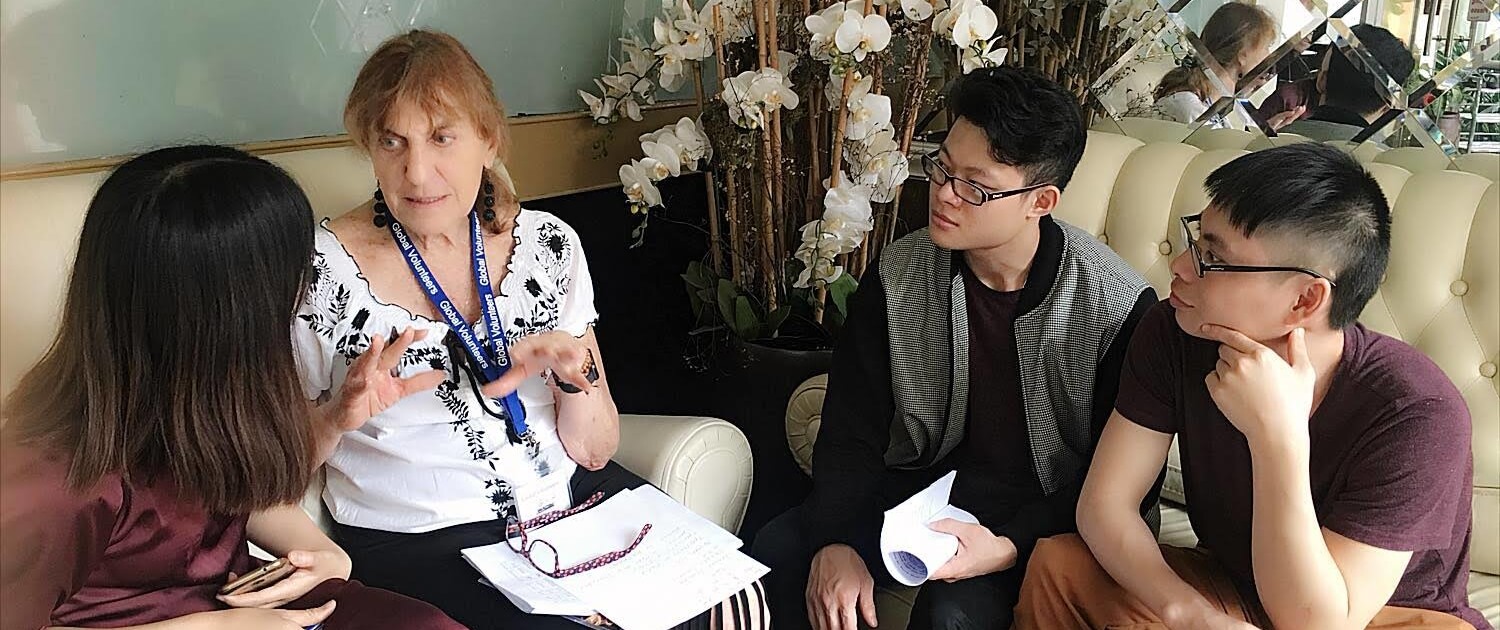
Triệu Thị Huệ: “I can’t remember looking forward to anything.”
Huệ was born into an extremely poor family in Bac Kan, a very poor mountainous province in northern Vietnam. When Hue’s mother was pregnant with her, she contracted chicken pox, causing Huệ’s blindness. Her parents are both farmers, tending a few buffaloes and chickens and farming rice and tapioca. She has two younger sisters and a younger brother, twenty-three years old, who is completely deaf. Yet, Huệ shares that these impairments have worked for good, resulting in a special bond between her and her brother.
Huệ lived at home with her family until she turned 18 in 2008. It was a lonely childhood. Because other children played with sighted kids and shunned she doesn’t recall knowing happiness. “I can’t remember looking forward to anything,” she relates. In that year, a group of traveling handicapped musicians visited her village to give a performance. Her sighted siblings encouraged her to join the group to support herself. Though she claims to have little to no interest in music and no particular talent in singing, with little else to do, Huệ decided to go on the road with them. It was to be an eleven-year road trip of adventures, marked by often painful and difficult experiences. Some of these include singing in the rain with water up to her ankles desperate, going hungry, and sleeping out in the open or on the floor of village cultural centers.
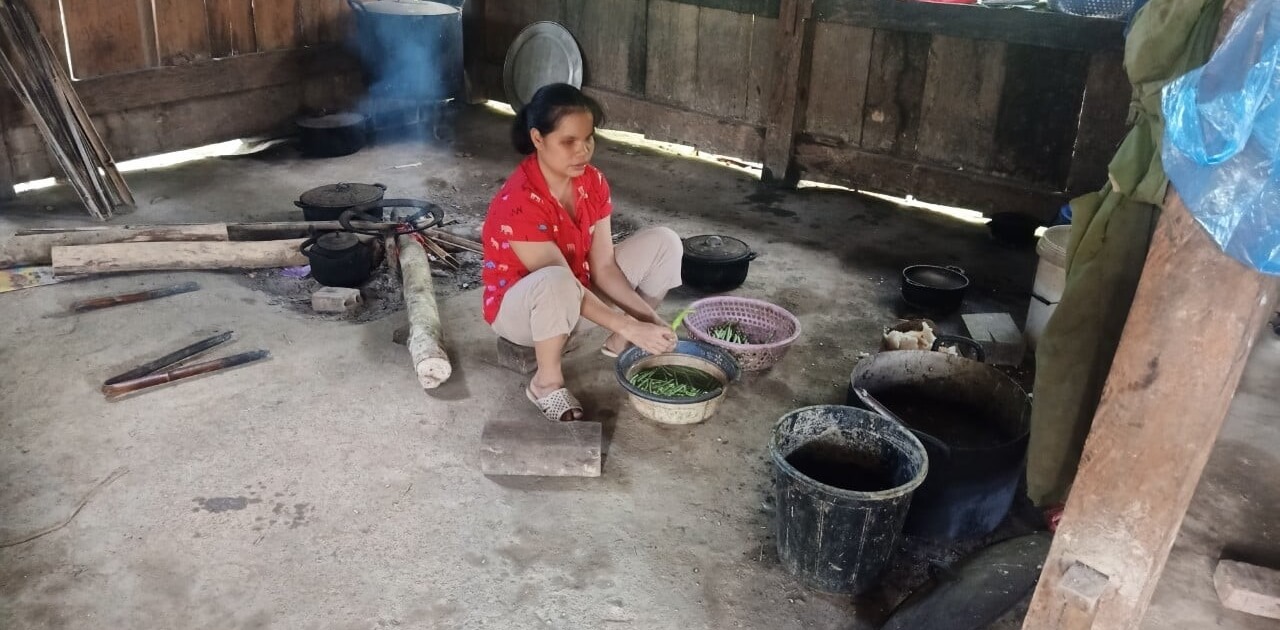
In 2013, Huệ became involved with a bandmate, a man who was also blind. When they learned they were expecting a child, they married, but soon after, Huệ’s husband abandoned her and their daughter. Unable to return to her family’s unstable environment, she was taken to an orphanage. But, because she had living biological family members, she and her daughter were turned away.
About this time, a local NGO learned of her plight and directed her to Blind-Link, which gave her housing at the Omamori Spa’s apartment with other female blind students in Hanoi. Up to this point, Huệ had never attended any school nor received any private instruction. So the first formal instruction she received was massage training at Omamori Spa, and more recently, English instruction from Global Volunteers.
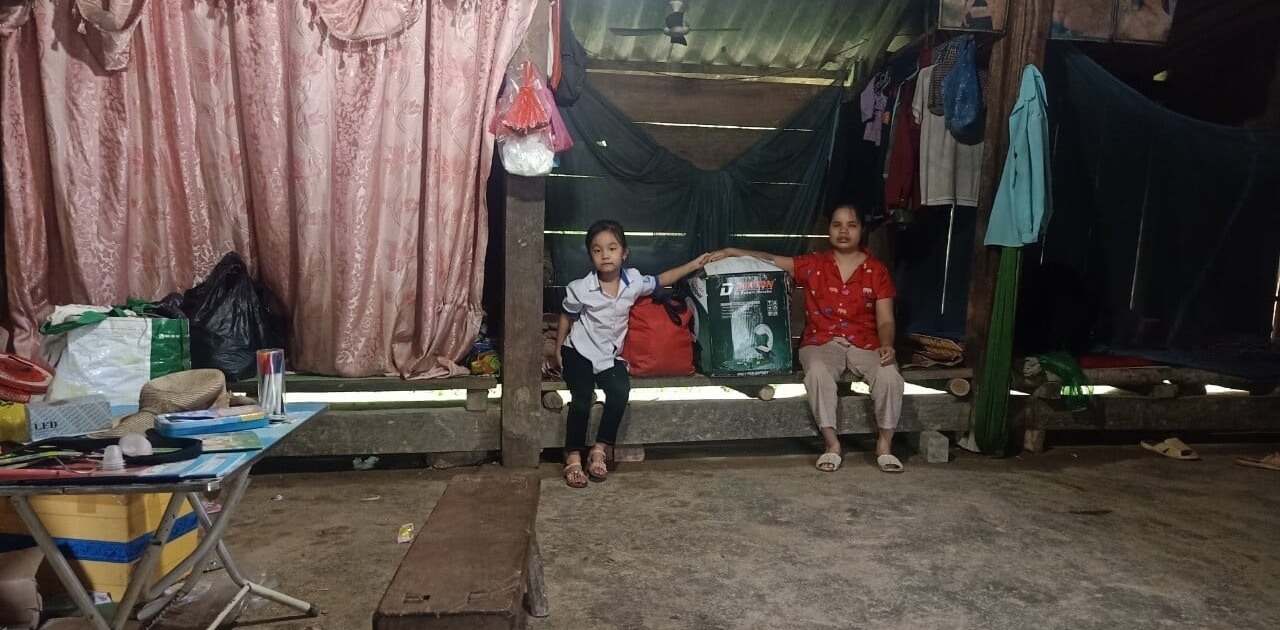
With this security, Huệ quickly established herself as a hard-working student, practicing morning, noon and night the new techniques she learned. She’s outperformed others at Omamori, and proven herself similarly capable in her English lessons with Omamori staff and volunteers.
She says becoming independent is a source of great pride. “The happiest moment in my life was when, after completing my first level of training, I received a call from the receptionist’s desk informing me that I would be giving my first paid massage. All of the staff present gave me a huge round of applause and encouragement,” Huệ proudly shares. Earning an income to send money to her daughter and her family has produced many happy stories to tell.
Hồ Sĩ Cường: “Is it a dream?”
For 37 years, Hồ Sĩ Cường lived in a small house in the countryside with his mother and sisters. While he and one of his sisters are blind, they lived “carefree and unconcerned,” under the protection of their mother and sisters. In his mid-20s, he had attended a three-month massage training class and a six-month braille course in a different province. But it didn’t result in permanent employment. Eager to improve his independence, his mother arranged for him to study at Blind-Link, where a cousin had preceded him. Although Cường was concerned about surviving in a big city, he was motivated by the earning opportunity.
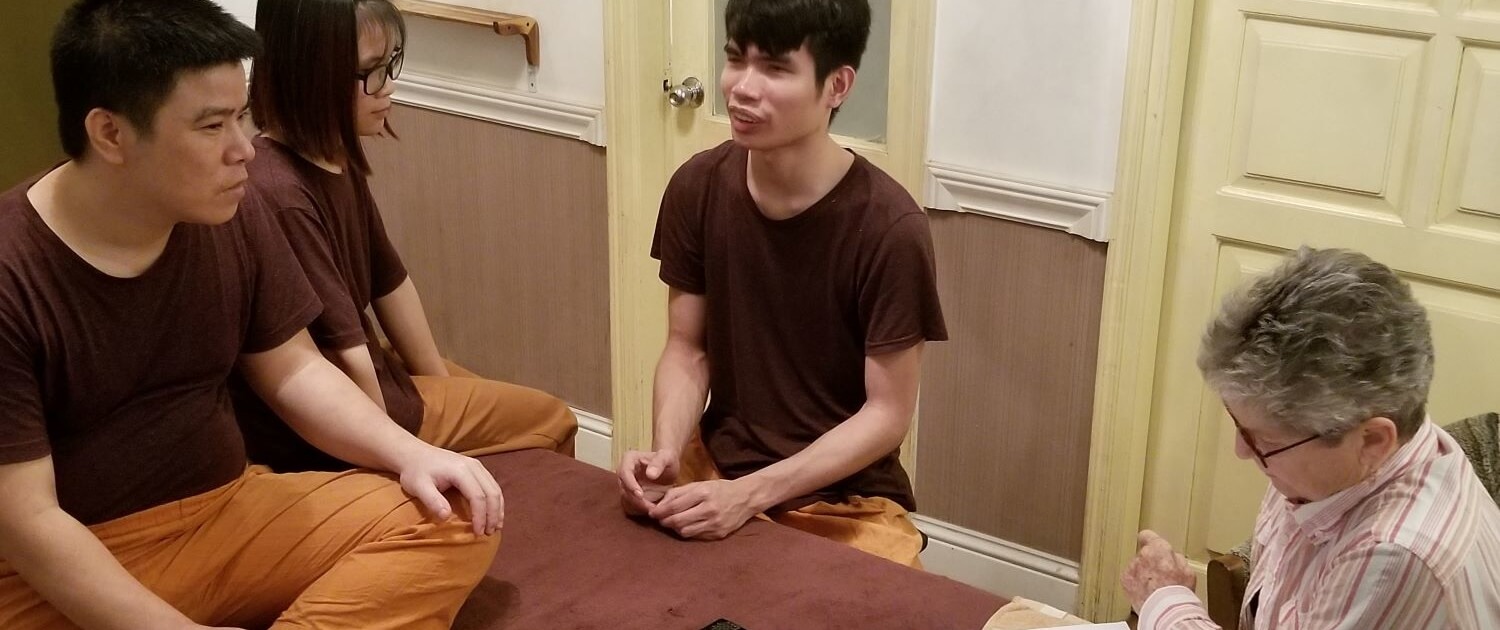
In 2018, Cường and his mother arrived “with a small backpack and the mindset of a small bird forced to spread its wings to fly into the vast blue sky” at Omamori Spa. “I was like a little boy, holding mom’s hand, and didn’t want to let go,” Cường admits.
The first days at Omamori Spa were confusing, but when he learned that all the other visually impaired students could work, cook, sing, play musical instruments, and even speak English, he knew he was in the right place.
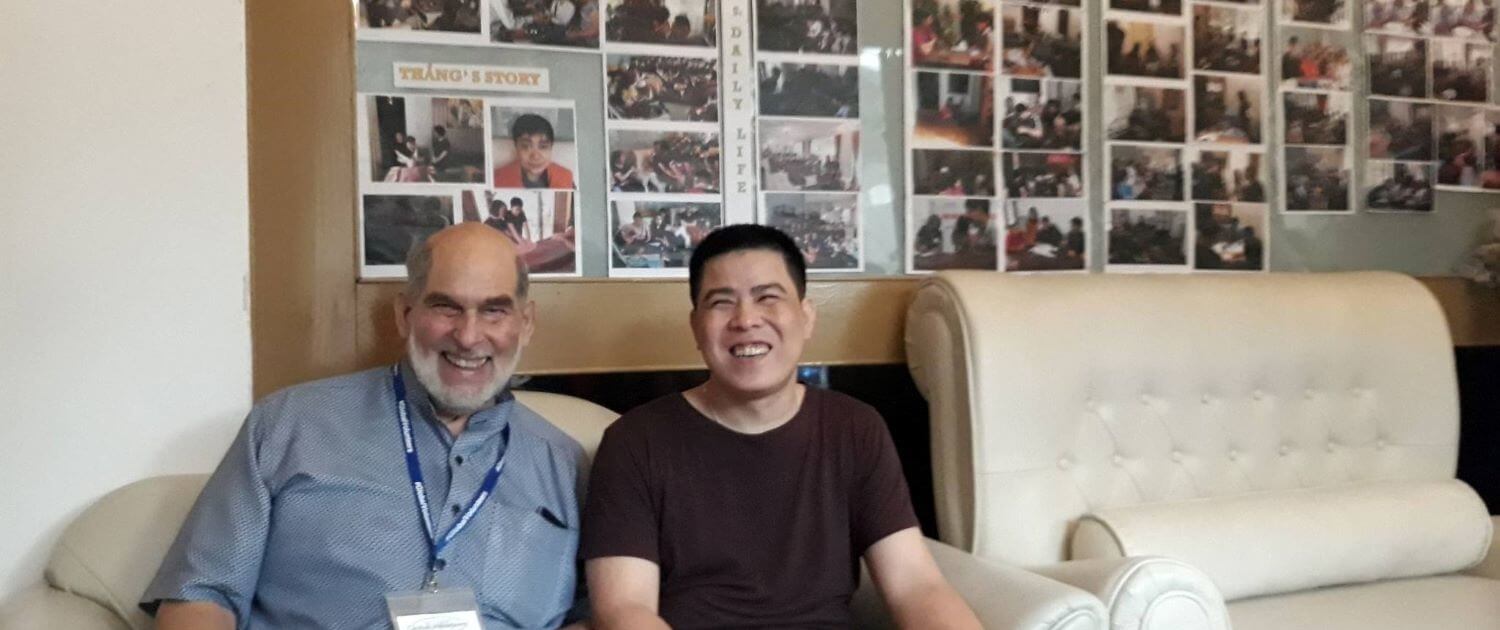
But Cường struggled with massage classes. His hands were “as rigid as log” and his body hadn’t been active for a long time, so he could not move flexibly, he recalls. He feared this occupation was a bid fit. “But thanks to the encouragement and support of my cousin, the affectionate strictness of the two Moon and Sun teachers, the full assistance of my sister, and colleagues, and a secret desire inside, I persisted in maintaining learning and training,” Cường remarks. His perseverance and effort finally paid off.
“Is it true or is it a dream?” he wondered when on January 1, 2019, he learned he would finally become a therapist at Omamori Spa. “To be more certain, I pinched myself,” Cường recalls. “Something exploded inside – a strange but not unpleasant feeling. I was happy, no, ecstatic! What is this emotion called? It was the happiness I had never experienced before.” Now that he was earning a living “I will no longer be known as a useless person, who can only live by depending on others,” Cường said.
Because 70% of Omamori Spa’s clients are foreigners, English plays an essential role in Blind-Link’s training program. Global Volunteers’ English instruction complements Blind-Link’s innovative training techniques so dozens of students can work and support themselves and sometimes – even their families. Since Global Volunteers offers a unique chance to learn from and interact with native speakers, Blind-Link and each of its students are eager for volunteers to serve in Hanoi!
You may also like:

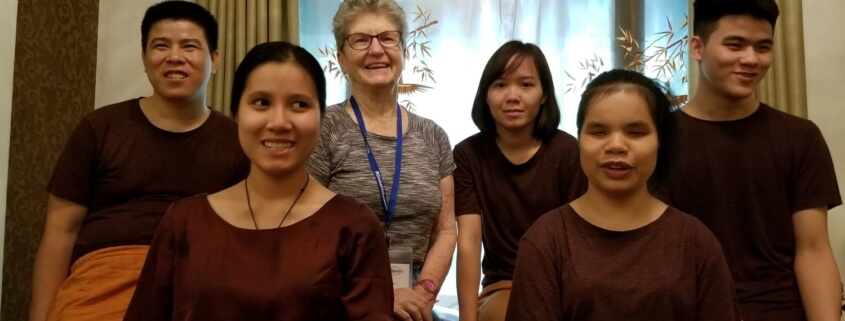


Leave a Reply
Want to join the discussion?Feel free to contribute!